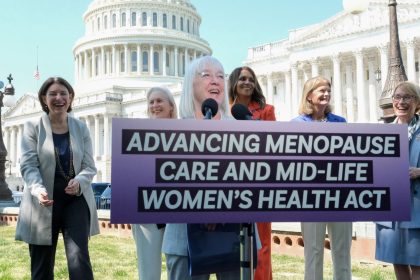Air Pollution Disproportionately Impacts Communities of Color

A new report from the American Lung Association finds that more than four in 10 people in the U.S. live with polluted air, placing their health and lives at risk.
Even more concerning was that, of the 135 million people currently living in places with polluted air, people of color were 61% more likely to live in a county with unhealthy air than White people, and three times more likely to live in a county that failed all three air quality grades.
“We are calling on President Biden to ensure environmental justice,” said Laura Kate Bender, the assistant vice president of the American Lung Association.
The report, which includes a petition for the federal government to reduce pollution and fight climate change, analyzes air quality monitoring data from the Environmental Protection Agency of 217 counties across the U.S. collected between 2017-2019.
“What we continually find with ozone and particle pollution is that the science keeps showing they are harmful for us in more ways than we thought,” said Bender.
Long-term exposure to ozone and particle pollution can lead to health conditions like asthma, inflammation of the lungs, heart disease, heart failure, stroke, susceptibility to respiratory infections like pneumonia, increased risk of metabolic disorders, reproductive harm, allergic responses and may lead to premature death.
“There are still communities that haven’t seen the benefit of clean up. We know that due to the structural and racial inequities those communities are living closer to pollutant sources like power plants, and hopefully Congress takes action on cleaning up those communities,” said Bender.
In New York, for example, 74% of Black and Latino people live where particle pollution levels from on-road transportation exceed the state average and are exposed to far greater levels than White residents.
Climate change is driving conditions which increase the harm of air pollution globally, as conditions are better for wildfires to form, leading to an increase in particle pollution in areas like Los Angeles, Calif., which was ranked by the American Lung Association as the worst place for air quality 22 years in a row.
“We grade quality of air based on measurement of pollutants, and not efforts to clean it up. California has made enormous strides to make air quality much cleaner,” said Bender.
Biden’s recently introduced infrastructure plan sets aside $174 billion for electric vehicles, and Bender and researchers from the American Lung Association determined that transitioning to an electric vehicle fleet would prevent 6,300 premature deaths, 93,000 asthma attacks, and 416,000 lost workdays by 2050.
They also estimated about $72 billion in health savings, and $113 billion in climate savings from switching to electric vehicles.
“We are on the road to clean air, the wide scale transition to electric vehicles could achieve health benefits, and the economic impact associated with those health benefits,” said Bender.
Aside from electric vehicles, historically, environmental policies which reduce pollution have played a major role in establishing better air quality, especially for communities of color.
The Clean Air Act has proved to be the “single largest contributor to racial convergence in pollution exposure in the U.S. since 2000, accounting for over 60% of the reduction,” according to findings from a working paper released by the National Bureau of Economic Research.
“The Clean Air Act sets thresholds for key air pollutants. If a county is above those thresholds, then it is required to reduce air pollution until it is below the threshold. The EPA can require a county to take many different actions in order to meet Clean Air Act thresholds, like mandating abatement technology or even shutting down polluting plants,” said Janet Currie, a researcher of the paper and professor of economics and policy affairs at Princeton University.
Currie’s working paper combined satellite measurements of local air quality with administrative data on 30 million household’s locations to examine how racial disparities in pollution exposure have evolved over the last 20 years.
“The previous administration had replaced scientists on the advisory boards with industry people and restricted the types of evidence that could be considered. The Biden administration is reversing these moves which will strengthen environmental protections for everyone,” said Currie.
Trump’s EPA was heavily criticized for cutting $2.5 billion from the EPA budget for researchers to study environmental and health regulations. A number of pollutant specific panels were also dismissed.
The former EPA administrator also issued a directive which blocked scientists with EPA grants from serving on advisory boards.
Biden announced new environmental justice goals at his climate summit last week, stating $1 million dollars in funding will be provided to the EPA’s commission on environmental cooperation to work with underserved and vulnerable communities, including indigenous communities in Canada, Mexico, and the U.S.
He also announced the set-up of “energy transition” initiatives through the DOE to focus on increasing climate resistance for island and remote communities, starting with Caribbean and Asia-Pacific, and creating a “Local 2030 Island Network,”, which links the U.S. Island jurisdictions with those around the world in developing common solutions in a shared cultural context.
“Climate change is a health emergency but also a health opportunity, we have this chance to use this need to respond to climate change to switch away from dirty resources, and ensure a healthier future, from an air quality perspective,” said Bender.
























